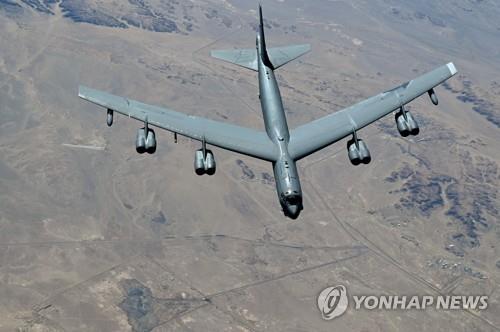- California Assembly OKs highest minimum wage in nation
- S. Korea unveils first graphic cigarette warnings
- US joins with South Korea, Japan in bid to deter North Korea
- LPGA golfer Chun In-gee finally back in action
- S. Korea won’t be top seed in final World Cup qualification round
- US men’s soccer misses 2nd straight Olympics
- US back on track in qualifying with 4-0 win over Guatemala
- High-intensity workout injuries spawn cottage industry
- CDC expands range of Zika mosquitoes into parts of Northeast
- Who knew? ‘The Walking Dead’ is helping families connect
S. Korea, U.S. hold air drills involving B-52H strategic bomber: defense ministry
South Korea and the United States held combined air drills, involving at least one U.S. B-52H strategic bomber, Wednesday, Seoul’s defense ministry said, amid joint efforts to sharpen deterrence against evolving North Korean threats.
The bomber was redeployed to the Korean Peninsula about a month after its last deployment here amid tensions caused by Pyongyang’s provocative moves, such as its unveiling of the Hwasan-31 tactical nuclear warhead last week.
The South Korean Air Force mobilized its F-35A radar-evading fighters for the drills, while the U.S. side deployed F-35B and F-16 fighters.
The training focused on practicing procedures to protect the strategic bomber from potential aerial enemy threats, and strengthening the allied forces’ interoperability and combined operational capabilities, according to the ministry.
“It is assessed that the successive deployments to the peninsula of key U.S. strategic assets have represented the U.S. putting into action its determination to defend the Republic of Korea (ROK) and its efforts to enhance the credibility of extended deterrence,” the ministry said in a press release, referring to the South’s official name.
Extended deterrence refers to the U.S.’ commitment to using the full range of its military capabilities, including nuclear, to defend its ally.
Lt. Gen. Park Ha-sik, the commander of the ROK Air Force Operations Command, said the two countries’ air drills demonstrated their alliance’s “perfect” readiness to respond “swiftly and overwhelmingly” to any North Korean provocations.
U.S. Seventh Air Force Commander Lt. Gen. Scott L. Pleus underscored the allies’ teamwork is “stronger than ever.”
“We have the capability and posture to complete any mission we will be tasked with,” he was quoted as saying.
In recent months, the U.S. has deployed a series of its high-profile military assets, including a nuclear-powered aircraft carrier, in an apparent show of force against potential North Korean provocations.












